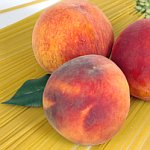|
|
 Peaches are believed to be native to China. They are cultivated throughout
warm temperate and subtropical regions of the world. In the peach fruit, the
stone is covered with a fleshy substance that is juicy, melting, and of fine
flavor when matured and mellowed.
Peaches are believed to be native to China. They are cultivated throughout
warm temperate and subtropical regions of the world. In the peach fruit, the
stone is covered with a fleshy substance that is juicy, melting, and of fine
flavor when matured and mellowed.
The popular division of fruit
varieties into clingstones and freestones-referring to the relative tendency
of the flesh to cling to the stone-is by no means accurate. These two classes
merge in different varieties, and even the same variety may be freestone and
clingstone in different seasons. The nearly 300 varieties of peaches grown in
America have been classified into five races, each with outstanding
characteristics, ripening season, and uses.The nectarine is a variety of peach.
The principal peach-growing state is California. World production totaled about
5.5 million metric tons annually; the United States and Italy were the leading
producers.
How to Store:
To ripen peaches, store in a brown bag at room temperature. Ripe peaches can
be stored in the crisper bin of your refrigerator for up to five or sixdays.
Nutritional Facts:
· Fat-free
· Saturated fat-free
· Sodium-free
· Cholesterol-free
· High in vitamin A
· A good source of vitamin C
Detailed nutritional informatin can be found by searching the
USDA Nutritional Database
. Enter "Peach" (no quotes) as the keyword and select the link and
report of interest.
Scientific classification:
The peach belongs to the family Rosaceae. It is classified as Prunus persica.
|
|